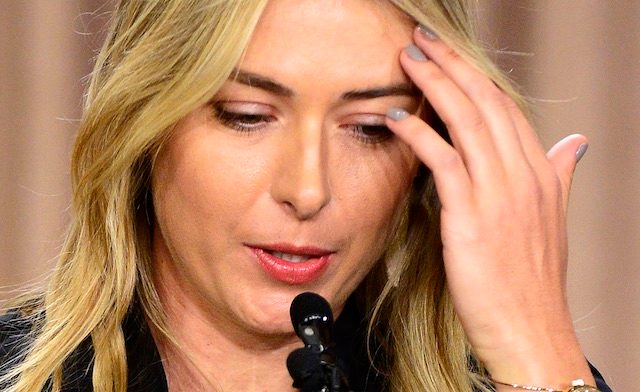SUMMARY
This is AI generated summarization, which may have errors. For context, always refer to the full article.

MANILA, Philippines – The manufacturer of meldonium, the substance which tennis champion Maria Sharapova tested positive for, says that a common course for the heart medication is 4 to 6 weeks – not 10 years.
“Depending on the patient’s health condition, treatment course of meldonium preparations may vary from four to six weeks. Treatment course can be repeated twice or thrice a year,” Latvian pharmaceutical company Grindeks tells the Associated Press in an email, adding that only a physician can determine if a patient should use it longer.
(EXPLAINER: What is Meldonium, the drug Sharapova tested positive for?)
Sharapova, 28, announced on Tuesday, March 8 that a doping test administered at the Australian Open in January had come back positive for the drug, which was added to the World Anti-Doping Agency’s (WADA) list of banned substances in January after having been announced in September.
She admitted that she had received an email on December 22 from WADA containing the changes its banned list but said she didn’t click on it.
The 5-time Grand Slam champion says she first was prescribed the medication in 2006 because she had “several health issues going on at the time” which included an irregular EKG heart test and a family history of diabetes, but didn’t say whether or not she had consistently used the medication since then.
“It is very important for you to understand that, for 10 years, this medicine was not on WADA’s banned list and I had been legally taking that medicine for the past 10 years,” Sharapova said.
The medication is not approved for use in the United States and is most commonly used in Eastern Europe, according to German anti-doping expert Mario Thevis. AP says it was able to buy the medication over-the-counter in Moscow, Russia.
WADA had listed the drug as a “monitored” substance prior to banning it because it “aids oxygen uptake and endurance,” and a number of athletes have failed tests because of the drug since then.
Olympic gold medalist ice dancer Ekaterina Bobrova confirmed she had tested positive for Meldonium at the European Championships in January, while Ukrainian biathletes Artem Tyshchenko and Olga Abramova have also tested positive.
“There is a potential of the substance to enhance performance and it has been described as a means to facilitate recovery and to enhance physical as well as mental workload capabilities,” said Thevis.
Grindeks wouldn’t comment on whether the medication would be appropriate for the conditions Sharapova had described.
Victor Conte, the founder of the controversial BALCO lab turned anti-doping advocate, commented on Twitter that he believed “Sharapova was using this medication as a PED. Why would a doctor prescribe this without a heart condition?”
IMO. Sharapova was using this medication as a PED. Why would a doctor prescribe this without a heart condition? https://t.co/ueMZKROuOt
— Victor Conte (@VictorConte) March 8, 2016
Sharapova’s attorney, John Haggerty, said she could face a ban of up to 4 years from the International Tennis Federation (ITF), but that mitigating factors could lessen the penalty.
The fallout of her announcement has seen Nike and Porsche suspend their endorsement deals with Sharapova, while watchmaker TAG Heuer decided not to renew its deal.
(READ: Pacquiao, Sharapova are not the first to fall out with Nike)
Sharapova has been “provisionally suspended” by the ITF “pending determination of the case.” – Rappler.com
Add a comment
How does this make you feel?
There are no comments yet. Add your comment to start the conversation.